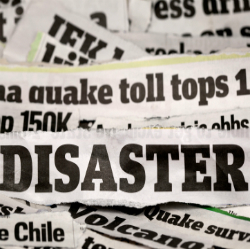When tragedy happens: Do you discuss it with your child or not?

Road, accidents, school shootings, wars, terrorist attacks. The images we see on television are more and more explicit and children are exposed to these despite our best efforts. The 24-hour news channels like Newsworld, Fox and CNN broadcast very graphic and lasting images of tragedies and it’s not always easy to control what your child sees. One image, even for just a couple of seconds, can cause your child to have questions and worries.
As a parent, you’re the reference, and your children turn towards you with their questions and fears. They need you to be there to answer their questions, listen to them, and above all, reassure them. It’s important for them to understand that they are safe with you despite the terrible events that they’ve seen.
Your response to the tragedy
Your response to the tragedy
When a tragic event happens, children look towards their parents or other adults they trust to see how they should react; they try to understand what happened through their parents’ reactions. A parent’s feelings of panic or fear can contribute to a child’s sense of distress or anxiety. It’s important to stay calm in order to reassure your child. You can share your compassion and sadness for the victims or your admiration for the rescuers to help give your child a sense of what has happened.
Tackle the questions according to their age
Tackle the questions according to their age
Children react differently depending on their age and their development. Children who are more anxious by nature will likely be more affected by the event. The younger a child is, the more important it is to explain it in a clear and simple way with words that are familiar to him.
For example, in the case of a school shooting, something that is unfortunately all too frequent these days and which particularly touches a child’s world, explain that the person who committed the crime very likely had serious problems. Avoid using the typical descriptions that everyone uses to describe the person.
As much as possible, avoid letting your children see images on television or the internet that are broadcast around these events. All the images associated with these tragic events (crime scenes, families and others crying, photos of the person responsible for the tragedy) can leave their mark.
Some children might think that the tragedy is their fault. Make sure they understand that they are not to blame for what happened and that they had nothing to do with the tragedy.
Older children may ask more questions and it’s important to answer and discuss these with them. Their questions may include how could we have avoided the incident, why are there natural disasters, and what makes people so destructive. Always try to find positive examples that will help balance their perception of things.
Even if they want to discuss and understand more, it’s not necessary to go into details. Let your child ask questions and give him answers at a pace that’s comfortable for him.
Be patient
Be patient
If your child is very affected by the news, he might need to talk to you about it often. Be patient and try to reassure him each time. Talk about the tragedy with another adult when your child is listening and make sure that what you say is reassuring. Don’t avoid the subject. It’s important that your child knows he can talk to you about his worries. Words like « Forget it », or « It won’t change anything by talking about it », are not recommended because they don’t allow children to understand what’s going on and they can leave them with the impression that they can’t talk about it and that they should keep their emotions to themselves.
If your child is directly affected by the tragedy because he has lost someone dear to him or because he was a witness to the event, it makes more sense to seek the help of a professional since in your role as parent, you may also be affected by what happened. However, don’t avoid the subject; your child will need to feel that he is being listened to and that he is protected.
Be affectionate with your child; give him kisses and hugs and show him you are there for him and that you will protect him.
Be alert – look for the signs
Be alert – look for the signs
It’s important to watch for your child’s reactions following a tragedy. If you notice changes in his routine or personality, increased anxiety or the appearance of behaviours associated with anxiety such as wetting the bed (if he hadn’t been doing it before), recurring nightmares, loss of appetite or trouble sleeping then you should consult a professional. Certain signs might indicate that your child is suffering from post-traumatic stress.


